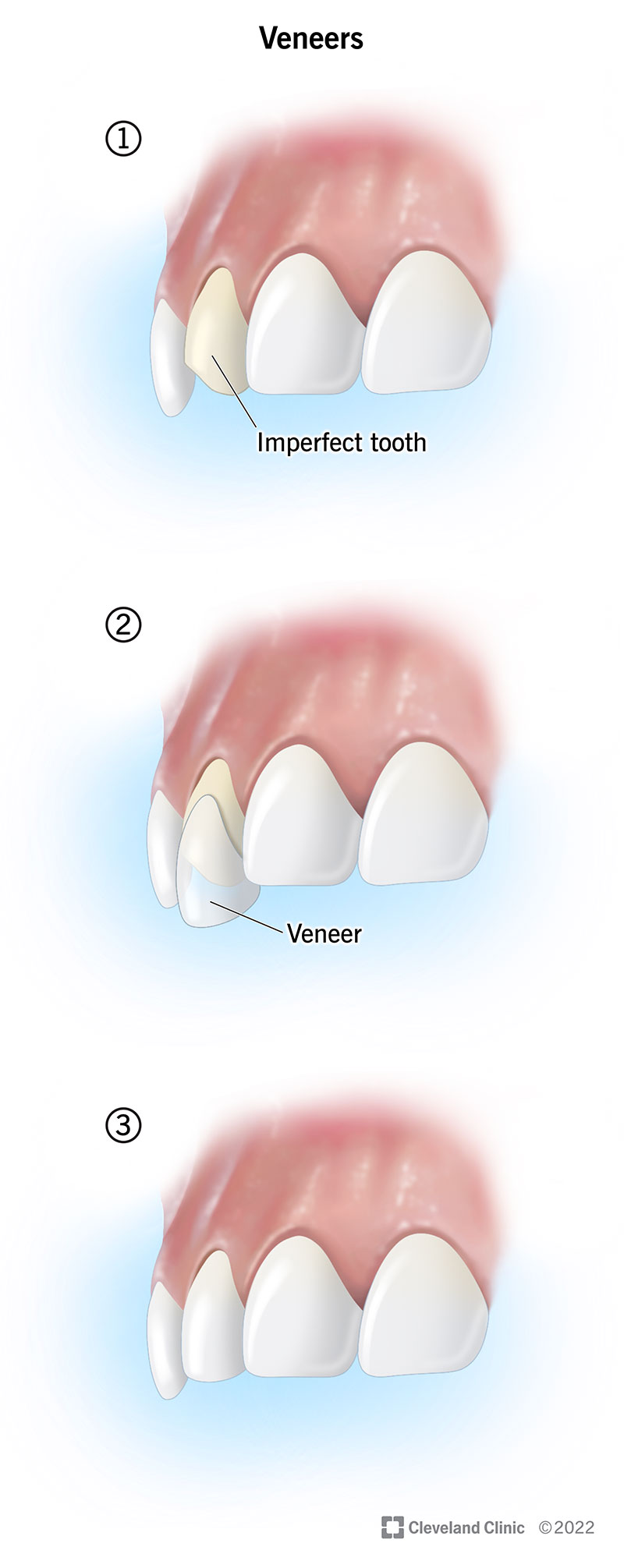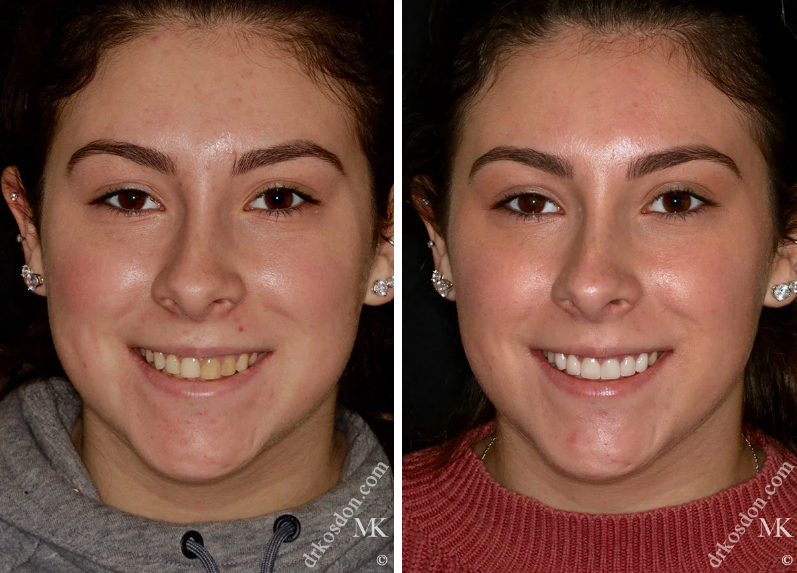Unlocking the Tricks of Veneers: Truths, Types, and Advantages for a Beautiful Smile
Veneers offer a compelling remedy for those looking for to enhance their smiles. These dental improvements can address various blemishes, from discoloration to imbalance. With alternatives like porcelain and composite, people can pick based on their preferences and requirements. Nevertheless, comprehending the nuances of veneers, including application and care, is important. What elements should one think about prior to deciding? The solutions might stun those thinking about this visual oral option.

Recognizing Veneers: What Are They?
Veneers are slim, customized coverings created to cover the front surface area of teeth, improving their appearance. Usually crafted from resilient materials, these shells are customized to fit each individual's teeth exactly. They serve numerous purposes, including dealing with aesthetic imperfections such as staining, chips, or gaps. The application process entails a dentist preparing the teeth, typically by getting rid of a percentage of enamel to assure a tight fit. When prepared, the veneers are adhered to the teeth using a strong adhesive.
People usually select veneers for their ability to create a natural-looking smile while giving a resilient remedy to oral flaws. Unlike other cosmetic dental care options, veneers require minimal invasive procedures, making them a popular option. The result is an improved smile that can greatly improve an individual's confidence and self-confidence. Generally, veneers use an effective strategy to accomplishing a much more harmonious and appealing oral look.
Kinds of Veneers: Porcelain vs. Composite
When considering aesthetic dental options, 2 primary sorts of veneers stick out: porcelain and composite. Porcelain veneers are crafted from a sturdy ceramic material that mimics the natural look of teeth. They are known for their stain resistance and capacity to mirror light similarly to all-natural enamel, supplying a visual allure that numerous people desire. The application process commonly includes more preparation of the tooth structure and might call for several sees to the dental professional.
On the various other hand, composite veneers are made from a tooth-colored material that is straight related to the teeth. This kind enables quicker application and can typically be completed in a solitary visit. While they are less costly than porcelain veneers, they might not offer the very same longevity or resistance to staining. Inevitably, the choice between porcelain and composite veneers depends on specific choices, budget plan, and details dental demands.
The Benefits of Deciding On Veneers
Selecting veneers uses various benefits that can significantly boost both the aesthetic appeals and functionality of an individual's smile. Among the primary benefits is their ability to deal with imperfections such as staining, voids, and imbalance, resulting in a more consistent look. Veneers can additionally improve the resilience of teeth, offering a safety layer that shields them from damages.
They require marginal tooth preparation compared to other dental procedures, protecting more of the all-natural tooth structure. This preservation adds to a healthier oral atmosphere while still achieving a sensational smile.
Veneers are very adjustable, allowing individuals to select the shape, dimension, and color that ideal fits their preferences. Additionally, they are stain-resistant, making it much easier to maintain a brilliant and appealing smile in time. In general, veneers present a reliable choice for those looking for both cosmetic improvement and long-lasting oral health benefits.
The Veneer Application Process
The veneer application process involves several key steps to ensure perfect results. Initially, an examination is conducted to assess the patient's requirements, adhered to by the prep work and shaping of the teeth. The veneers are bound in location, with adjustments made for a best fit and appearance.
Initial Examination Steps
A thorough initial appointment is essential for any individual thinking about veneers, as it sets the structure for an effective therapy. Throughout this conference, the oral specialist examines the individual's oral wellness, talking about any type of existing issues that might impact the veneer application. This evaluation might include X-rays and a visual exam to figure out the problem of the teeth and gums.
The dental practitioner likewise engages the person in an in-depth discussion concerning their aesthetic goals, preferences, and assumptions. They might present different veneer options tailored to the person's certain requirements. Additionally, the expert discusses the treatment, potential risks, and aftercare demands, ensuring that the person is knowledgeable and comfortable before waging the therapy.
Prep Work and Shaping Teeth
After the first consultation, the next stage includes the prep work and shaping of the teeth to accommodate the veneers. This important step is carried out by the dentist, that carefully analyzes the tooth framework to figure out the amount of enamel that requires to be gotten rid of. Generally, a slim layer, generally around 0.5 millimeters, is slashed off to guarantee a correct suitable for the veneers. Accuracy is critical during this procedure, as it affects both the general comfort and the aesthetic outcome. As soon as the teeth are appropriately shaped, impressions are taken to develop custom veneers that line up completely with the person's oral profile. This meticulous prep work establishes the stage for a successful veneer application, improving both look and function.
Bonding and Final Adjustments
Following the shaping and preparation of the teeth, the bonding procedure begins, noting an essential phase in the veneer application. During this stage, an oral adhesive is put on the prepared tooth surface area, assuring a strong bond between the tooth and the veneer. The dental practitioner thoroughly places the veneer, making changes to achieve the wanted placement and visual appeals. Once correctly placed, an unique light is used to heal the glue, strengthening the bond. After treating, the dentist carries out last changes, trimming any excess material and refining the veneer's form to ensure an all-natural appearance. This mindful interest to information boosts both feature and appearances, adding to a general stunning smile that is long lasting and lasting.
Taking care of Your Veneers: Upkeep Tips
Taking care of veneers is necessary to keep their appearance and long life. A regular everyday cleansing regimen, mindful evasion of staining foods, and normal oral exams are crucial parts of effective upkeep. These techniques help ensure that veneers stay in peak problem and remain to boost one's smile.
Daily Cleansing Regimen
Regularly keeping veneers is important for their longevity and appearance. An appropriate daily cleansing routine can help preserve their luster and prevent damage. Dental professionals recommend cleaning twice a day with a soft-bristled tooth brush and fluoride toothpaste, making certain that all surface areas are cleansed carefully to avoid damaging the veneer surface area. Flossing everyday is additionally vital to eliminate food particles and plaque from between teeth, where brushes find more may not reach. Furthermore, utilizing an antimicrobial mouth wash can aid keep dental hygiene without harming the veneers. It is advisable to prevent unpleasant cleansers and tools that can scratch the veneer. By adhering to these simple steps, individuals can keep their veneers looking beautiful while promoting general oral health and wellness.
Staying Clear Of Discoloration Foods
Although veneers are made to improve the look of teeth, their susceptibility to staining necessitates careful dietary choices. It is important for individuals with veneers to be conscious of particular foods and beverages that can bring about staining. Dark-colored items such as coffee, red white wine, and berry juices need to be consumed in moderation, as they are recognized to tarnish both all-natural teeth and veneers. Additionally, acidic foods like citrus fruits can compromise the bonding agents made use of in veneers, making them more prone to discoloration. To keep a brilliant smile, it is advisable to rinse the mouth with water after eating staining foods and to exercise routine oral health. These thoughtful selections add substantially to the durability and appearances of veneers.

Normal Dental Exams

Maintaining the integrity of veneers calls for a dedication to routine dental examinations, as these appointments play a vital role in guaranteeing their longevity and appearance. Throughout these brows through, oral professionals can evaluate the condition of the veneers, looking for any type address of indications of wear, damage, or underlying dental problems. In addition, regular cleansings aid get rid of plaque and tartar that can gather around the veneers, advertising total dental health. Dentists can likewise provide individualized advice on treatment techniques and items suited for veneer upkeep. By sticking to a timetable of check-ups, individuals can attend to prospective issues early, ensuring their smile remains vivid and attractive. Inevitably, regular oral sees are a critical element of veneer treatment.
Is Veneers the Right Alternative for You?
Deciding whether veneers are the right alternative typically rests on specific oral demands and aesthetic goals. For those looking for to address concerns such as staining, chips, or imbalance, veneers can provide a transformative remedy. Prospects normally consist of individuals with healthy teeth however prefer an enhanced smile.
It is crucial to take right into account elements such as tooth enamel problem, the extent of dental issues, and the determination to maintain veneers. Consulting with an oral specialist is important, as they can review dental health and determine if veneers are suitable
Furthermore, prospective prospects must review the long-lasting dedication, as veneers might need substitute every 10-15 years. Price considerations also play a substantial role, as veneers can be a significant financial investment. Inevitably, the choice must be well-informed, stabilizing aesthetic wishes with functional considerations for long-term results.
Frequently Asked Concerns
For How Long Do Veneers Normally Last Prior To Needing Substitute?
Veneers commonly last in between 10 to 15 years prior to needing substitute. Factors such as dental health, way of living choices, and worldly high quality can affect their longevity, making normal dental exams vital for keeping their condition.
Are Veneers Safe for Individuals With Delicate Teeth?
Veneers can be secure for individuals with sensitive teeth, yet it typically relies on the extent of sensitivity and the dental professional's technique. Consulting a dental specialist before proceeding is important to guarantee optimal outcomes.
Can Veneers Be Gotten Rid Of or Changed Conveniently?

Do Veneers Stain Over Time, and Just How Can I Stop It?
Veneers can discolor in look at here now time, especially from foods and drinks like coffee or merlot. To avoid staining, maintaining excellent dental hygiene, utilizing a straw for drinks, and regular oral cleansings are suggested methods.
What Is the Expense Range for Getting Veneers?
The expense of veneers usually ranges from $500 to $2,500 per tooth, relying on elements such as product kind, dentist experience, and place. Clients ought to speak with dental professionals for individualized quotes and funding options.
When the teeth are effectively formed, perceptions are taken to produce customized veneers that line up perfectly with the patient's oral account. During this phase, an oral adhesive is applied to the ready tooth surface, guaranteeing a strong bond in between the veneer and the tooth. It is essential to take right into account elements such as tooth enamel condition, the extent of oral problems, and the desire to keep veneers. Veneers can be safe for people with delicate teeth, but it usually depends on the intensity of level of sensitivity and the dental professional's method. The cost of veneers usually ranges from $500 to $2,500 per tooth, depending on elements such as product type, dental practitioner experience, and place.